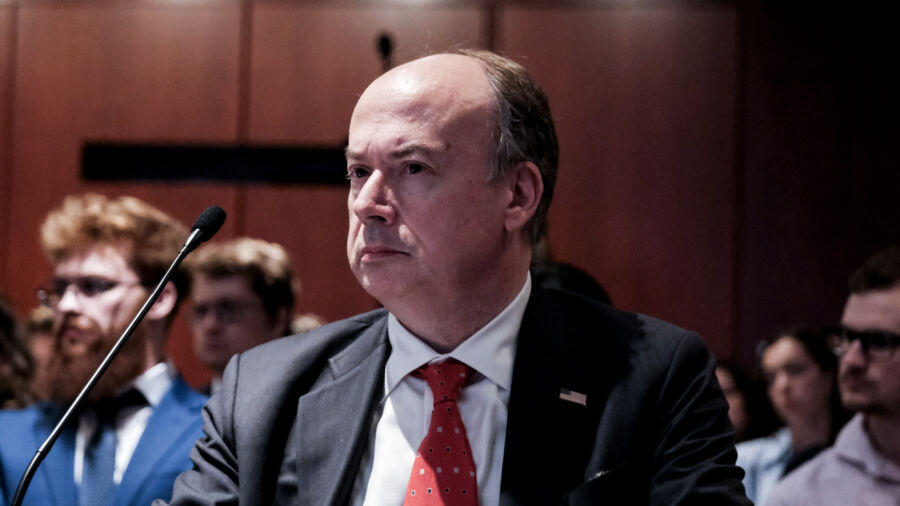Former U.S. Department of Justice (DOJ) attorney Jeffrey Clark faces possible disbarment as he goes to trial with the District of Columbia Bar’s Office of Disciplinary Counsel on March 26.
That office charged him in 2022 with violating his professional ethics after Mr. Clark, then acting assistant attorney general for the DOJ’s Civil Division, drafted a “Proof of Concept” letter at the behest of former President Donald Trump that urged top state officials in Georgia to investigate alleged election fraud.
The letter was drafted on Dec. 28, 2020, but was withheld by the DOJ after then-acting Attorney General Jeffrey Rosen and then-Deputy Attorney General Richard Donoghue said it contained false information.
Investigators in Georgia who filed 41 charges in August 2023 against President Trump, Mr. Clark, and 17 other c0-defendants under the state’s Racketeer Influenced and Corrupt Organizations (RICO) Act argue the letter is an example of Mr. Clark’s and the former president’s attempts to subvert Georgia’s 2020 election results.
The former DOJ attorney was also identified as one of six alleged co-conspirators in President Trump’s indictment related to his actions surrounding Jan. 6, 2021, filed by special counsel Jack Smith on Aug. 1, 2023, in Washington.
Trial Over Ethics
The D.C. Bar’s Office of Disciplinary Counsel, a professional ethics enforcement group for attorneys practicing in the nation’s capital, said it sanctioned Mr. Clark because he drafted the “Proof of Concept” letter in late 2020.
Mr. Clark, whose case is being litigated by D.C. Bar Disciplinary Counsel Hamilton “Phil” Fox, could face anything from a written warning to total disbarment at his March 26 trial.
The Epoch Times asked Mr. Fox what kind of disciplinary action he was seeking for Mr. Clark, but he declined to comment and said his office doesn’t generally discuss sanction recommendations until the trial reaches its sanctions phase.
Rachel Cauley, communications director and spokesperson for the Center for Renewing America, where Mr. Clark is a senior fellow and director of litigation, told The Epoch Times that the disciplinary counsel’s goal from day one has been to disbar Mr. Clark.
“The DC Bar prosecutor bringing this case is a longtime partisan warrior for the Left,” Ms. Cauley said in a written statement.
“Despite the fact that Hunter Biden was set to plead guilty to a crime, his DC law license isn’t even being investigated. Yet the DC Bar prosecutor told a court last month his arms would have to be torn off for him to postpone the trial against former top DOJ official Jeff Clark, who did everything right. Does that sound like equal justice? It’s not, and you’re not living in America anymore.”
Ms. Cauley told The Epoch Times that Mr. Clark’s trial, which has daily hearings, could last one to two weeks.
Appeals Court Blocks Subpoena
Mr. Clark scored a minor win in the case after an appeals court blocked the counsel’s office from subpoenaing him to hand over any documents he might have related to his 2020 election litigation efforts.
The three-judge panel ruled on Feb. 26 that the subpoena would force Mr. Clark to “be a witness against himself” as he is a co-defendant in both the Georgia and Washington criminal trials against President Trump. The panel said forcing Mr. Clark to hand over documents related to one of his pending cases would be a violation of his Fifth Amendment rights.
Additionally, the former DOJ attorney tried to defend his case on the basis of executive privilege.
President Trump’s attorney, Todd Blanche, wrote a letter to Mr. Clark on Jan. 12, instructing him to honor the former president’s executive privilege at the upcoming disciplinary trial.
“We hereby instruct you to maintain President Trump’s executive privilege and other related privileges, including law enforcement privilege, attorney-client privilege, and deliberative process privilege,” the letter said.
Mr. Clark tried to block his former aide Ken Klukowski, Mr. Rosen, Mr. Donoghue, and former White House deputy counsel Patrick Philbin from testifying in his disciplinary trial, arguing President Trump’s executive privilege barred their testimony. He also cited DOJ law enforcement privilege, deliberative process privilege, and attorney-client privilege for the former president.
However, on Feb. 28, Merril Hirsh, the chair of the D.C. Bar committee handling Mr. Clark’s case, rejected the former DOJ attorney’s bid, allowing the other witnesses to testify.
“We cannot accept the argument that former President Trump preserved a privilege as to testimony that he allowed to take place in a public proceeding, and which was subsequently reported on extensively by the press,” Mr. Hirsh wrote in his ruling.
“As there is testimony that could be provided in this proceeding that is already public, Mr. Clark is not entitled to the ruling he seeks that all testimony should be declared to be protected and barred in advance.”
Mr. Hirsh also noted that President Trump had already permitted the former officials to testify to Congress during its investigations into efforts to challenge the 2020 election results. Those testimonies would waive claims of confidentiality, such as executive privilege or attorney-client privilege, Mr. Hirsh ruled.
He wrote that since Mr. Clark indicated he would decline to testify directly at the trial and would instead invoke his Fifth Amendment rights, “Mr. Blanche’s instruction that Mr. Clark honor the alleged privileges seems to be of no practical effect.”
Allen Zhong, Catherine Yang, and Petr Svab contributed to this report.
From The Epoch Times


